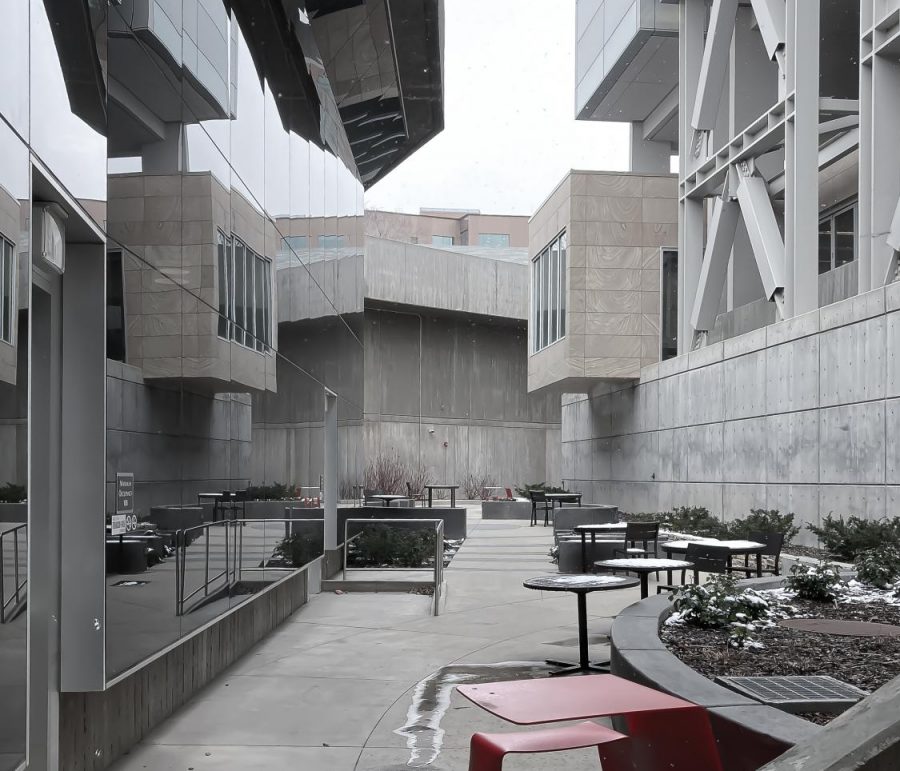J. Willard Marriott Library Reopening with Access to All Floors and More Hours for Spring Semester
J. Willard Marriott Library. (Photo by Hailey Danielson | The Daily Utah Chronicle)
February 2, 2021
On Jan. 19, the Marriott Library announced via Twitter it will reopen to enrolled students and staff, although other areas of campus remain closed.
During the Fall 2020 semester, there was limited access to many of the resources the library offers among limited hours. The second floor was one of the only areas open at the beginning of the semester, with all group study rooms converted to individual spaces to be reserved online.
After a “circuit breaker” from Sept. 27-Oct. 11, where the library was closed, it opened once more to add increased access. Study booths on level one opened for two visitors at a time. Level three also began providing the opportunity for reserving study rooms.
The study rooms initially only allowed one student, but then began allowing two. The reservation only allowed an individual to spend two hours total at the library on any given day — an hour in the morning and an hour in the afternoon, or two hours straight.
Students and faculty were also not allowed to browse the shelves of books. Instead, they were directed to search for them online, where they could then reserve and arrange pickup or shipment to their home.
Among shipping books, the library expanded its laptop and hotspot loan program. The CARES program has allowed hundreds of laptops and hotspots to be distributed in order to support students while they are learning remotely.
According to Ian Godfrey, the Assistant Dean and Facilities Director of the Marriott Library, there has been a high demand for physical access to the library and it has been crucial for student success. For the Spring 2021 semester, the schedule has been expanded by two hours on Saturdays.
“Student work schedules and child care have all changed during the pandemic and we’ve heard how critical weekend access is for those that can’t come to the library Monday-Friday,” Godfrey said.
The expansion of hours and areas of use requires more extensive sanitization procedures. The library will be working directly with campus custodial staff to ensure everything follows current recommendations.
Currently, everyone is required to wear a face-covering and participate in social distancing. There will be cleaning on high-touch/high-use surfaces, installation of plastic barriers at counters and hand sanitizing stations.
Other areas of campus remain closed or under strict regulation, such as on-campus housing. Students living on campus are not allowed to have guests from off-campus and must use the “grab and go” option for meals. HRE is also providing cleaning supplies and encouraging high touch cleaning.
Ella Spurlock, a third-year chemistry student, lives on campus and believes the library should be operating at full capacity because many students do not have access to quiet study areas and it can be very distracting to study in your room.
“I would love to see more study areas open up, especially for students living on campus. I am privileged enough to own a car and can drive to Coffee Break, but many others living here are not so fortunate,” Spurlock said.
Spurlock also said the U has an obligation to students’ mental health.
“I feel that at this point, everyone is familiar with COVID regulations and sanitizing. Opening and sanitizing more areas on campus does not seem like a huge endeavor. Just common courtesy to students who are paying nearly normal tuition for a reduced quality online education,” Spurlock said.
For more information on the Marriott Library’s cleaning procedures, times of operation, and rentals, visit their COVID-19 page.










Amanda • Feb 3, 2021 at 7:57 pm
I agree that this whole thing has been a disservice to students. Full access IS essential to students who have limited resources available. You can’t expect us students to have everything at the drop of the hat. I was at another university for a while that had mediocre education for the same price, and I pray that the U will not be like that because they care more about PR than the actual student body itself. We need access to resources of information, technology, a quiet place to study, food, even the mental stimulus of a social life.